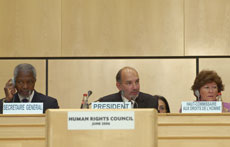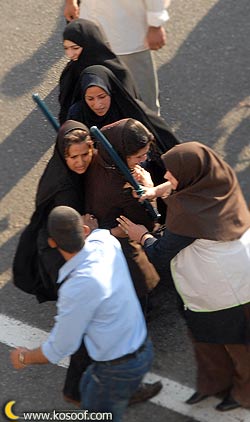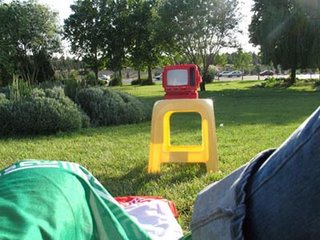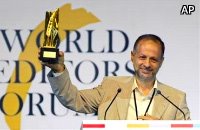PM calls for arrest of Iranian official
ALEXANDER PANETTACanadian Press
Canada's diplomatic battle with Iran reached a new intensity Friday as the federal government said it is seeking the arrest of a senior Iranian official implicated in the death of a Canadian.
The government wants charges brought against Iran's hardline chief prosecutor, who has been tied to the arrest of Zahra Kazemi, a Canadian photojournalist tortured and killed in Tehran in 2003.
Hard-line Iranian authorities said she died of a stroke, but a commission appointed by Iran's president found Kazemi died of a fractured skull and brain hemorrhage that were caused by the impact of a hard object. Iranian reformists have said she was tortured to death. Kazemi also had Iranian citizenship.
Prime Minister Stephen Harper confirmed Friday that the government asked German authorities this week to arrest Saeed Mortazavi if he stopped there on his way home from a human-rights conference in Geneva.
That German stopover didn't happen, but Mr. Harper said Canada will not give up.
“We're appealing to the international community to use all manner of law available to detain this individual, and have him face justice,” Mr. Harper said outside a cabinet meeting.
“I don't know whether we'll see a willingness or an ability to do that, but we want to make it absolutely clear that the government of Canada has not dropped this matter.”
Mr. Mortazavi, best known for ordering the closure of about 80 pro-reform newspapers, has been rumoured as an eventual contender to become Iran's justice minister.
Canada condemned his presence as an Iranian representative at a United Nations human rights conference in Switzerland this week.
Two Iranian government investigations have concluded that Mr. Mortazavi ordered Mr. Kazemi's arrest while she was photographing a prison, the Canadian government says. She died after apparently being beaten and tortured while in custody.
Foreign Affairs Minister Peter MacKay also accuses Mr. Mortazavi of falsifying documents to cover up his involvement in the case.
Mr. MacKay said Canada wanted him arrested in Germany because he could have claimed diplomatic immunity in Switzerland while attending the UN conference.
Mr. Mortazavi flew directly to Tehran from Geneva.
“Mark my words, this individual is on notice,” said Mr. MacKay. “If there is any way that Canada can bring this person to justice, we'll do it.”
And he warned Mr. Mortazavi or any other Iranian official who may accuse Canada of making libellous charges: “Take me to court. Come to Canada and make your case.”
He called Mr. Mortazavi's presence at an international conference and indication of Iran's “appalling . . . disregard and disrespect for human rights.”
Canada has limited diplomatic ties to Iran but has not cut off relations completely. The embassy in Tehran remains open.
Iran is barred from opening consulates in Canada. It has an embassy in Ottawa, but staff there need formal Canadian approval to meet any government official. Diplomatic contact is limited to discussions of the Kazemi case, human rights, and nuclear proliferation.
Relations were further strained recently when Mr. Harper commented on an erroneous media report that said Iran would force Jews to wear yellow patches on their clothing as the Nazis did during the Second World War.

 |
|









